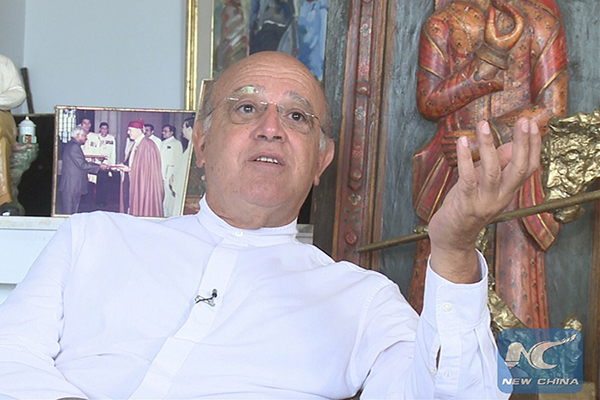China's Belt and Road Initiative to help Tunisian economy revive from slowdown: Former envoy
China's Belt and Road Initiative will help Tunisian economy to revive after six years of slowdown, former Tunisian Ambassador to China Mohamed Sahbi Basly told Xinhua in a recent interview.
|
Former Tunisian Ambassador to China Mohamed Sahbi Basly. [Photo/Xinhua] |
Basly, now the president of China-Tunisia Cooperation Council, hailed the initiative as "a perfect supportive approach for economic development."
He said China has been "a significant investment partner" for Tunisia that "has the potential to contribute to the development of the Tunisian economy."
"China has become a global economic locomotive in various fields, such as space, automobile, technology, real estate and agri-food," Basly said. "Tunisia could play a role in the relocation of Chinese manufacturing industries, because the production cost in China is more expensive than that in Tunisia."
"It will also help boost our country's economy which has gradually recovered from the unrest in 2011," he added.
Basly pointed out that Tunisian government announced a new investment law in April this year, which would provide potential benefits for Chinese investors.
"Recently, a big Chinese delegation has just finished a visit to the Zarzis economic zone in southeast Tunisia, which will promote the whole region's economic development," he said.
Basly praised the Belt and Road Initiative, under which China goes with other countries hand in hand to promote economic partnership and share economic development.
Proposed by Chinese President Xi Jinping in 2013, the Belt and Road Initiative, or the Silk Road Economic Belt and the 21st Century Maritime Silk Road, aims to build trade and infrastructure networks connecting Asia with Europe and Africa, along the ancient Silk Road trade routes to seek common development and prosperity.
Trade volume between China and Belt and Road countries in 2016 topped 1.07 trillion U.S. dollars, as China's direct investment in those countries stood at 14.5 billion dollars. Statistics showed that Chinese companies' total investment and acquisition in Belt and Road countries already exceeded 33 billion dollars as of early August.
The China-Tunisia ties have enjoyed healthy and stable development since their establishment 53 years ago.
Tunisian Foreign Minister Khemaies Jhinaoui, during an official visit to China in July, said that Tunisia fully supports the Belt and Road Initiative, and stands ready to be involved in the cooperation projects under the initiative.
"The Belt and Road Initiative encourages universal human contact," Basly said, adding that tourism is one of the strategic pillars of the initiative by promoting not only economic relations but also social and cultural relations.
With a history of over 3,000 years, Tunisia is rich in tourism resources. Since mid-February this year, Tunisia has exempted Chinese citizens from entry visas to visit the country.
Basly pointed out that Chinese tourists, who are obviously interested in historical monuments and open to other cultures and histories, are well-cultivated and also good consumers.
"The mixed elements of North African history, Arab culture and Mediterranean scene, are combined harmoniously here, which makes Tunisia an attractive destination to Chinese tourists," Basly added.
He said, to meet Chinese tourists' demands, Tunisia would prepare adequate infrastructure, improve its tourism products and highlight its rich cultural and historical heritage.
Basly foresaw, by the year 2020, the number of Chinese tourists around the world would reach 300 million. "If Tunisia could attract 1 million Chinese tourists by that time, we will hit the jackpot in tourism," he said.
